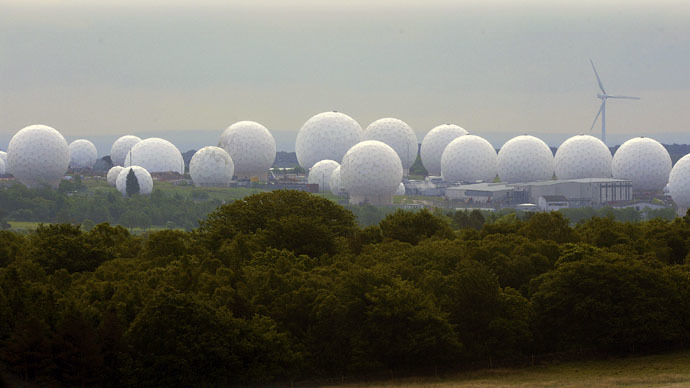Privacy rights group calls for 'democratic control' of UK spies

Civil liberties group Privacy International (PI) has criticized a controversial report on state surveillance, calling for improved regulatory oversight so spy agencies can be held to account.
The privacy rights group demanded the reforms after a report on state-sponsored snooping was published on Monday.
Conducted by foreign policy think-tank the Royal United Service Institute (RUSI), the study was titled ‘A Democratic License to Operate.’ Itformed part ofBritain’s broader Independent Surveillance Review.
PI agreed with some of RUSI’s findings but insisted that government-backed mass surveillance remains a deep concern.
READ MORE: ‘Refusenik’ spies may resist ‘intrusive capabilities’ disclosure
The privacy rights group warned that Britain's legal framework governing state surveillance relies on UK spy base GCHQ to self-report errors. It called for a “better resourced, more technically equipped oversight body” with the power to take “GCHQ to task.”
It also demanded “root and branch reform” to bring spies and the agencies they work for “under democratic control.”
“The RUSI report, from start to end, emphasizes how technological change has rendered the current legal system governing surveillance obsolete,” PI Deputy Director Eric King told RT on Tuesday.
“Every day, the highly technical GCHQ finds new ways to eavesdrop, while our oversight tries to cope with technical blind spots,” he said.
This surveillance versus privacy rights debate has long infiltrated British politics, as campaigners continue to criticize GCHQ’s invasive snooping practices.
Despite contentious leaks by ex-NSA computer analyst and whistleblower Edward Snowden, RUSI’s report claimed there is “no evidence that the British government knowingly acts illegally in intercepting private communications.”
It argued further that there is no proof that UK snoops collect data in bulk as a means of perpetually peering into the private lives of British residents.
RUSI’s study made a series of recommendations on how state surveillance should be conducted in the future, saying that the current legal framework for intercepting communications is unclear.
READ MORE: US & UK Intelligence pow-wow with IT brass in secretive summit
The think tank adds this legal framework “has not kept pace with developments in communications technology, and does not serve either the government or members of the public satisfactorily.
The think tank is calling for “a new, comprehensive and clearer legal framework” to regulate state surveillance.
At a confidential intelligence conference held at Ditchley Park in Oxfordshire in June, the views of a number of high-ranking intelligence officials came to light.
Investigative journalist Duncan Campbell, who attended the conference, said on his website that Snowden had transformed the global intelligence landscape.
“Perhaps to many participants’ surprise, there was general agreement across broad divides of opinion that Snowden – love him or hate him – had changed the landscape,” he said.
According to Campbell, a number of senior officials felt that shift “towards transparency, or at least ‘translucency’” was long overdue and deeply necessary.












